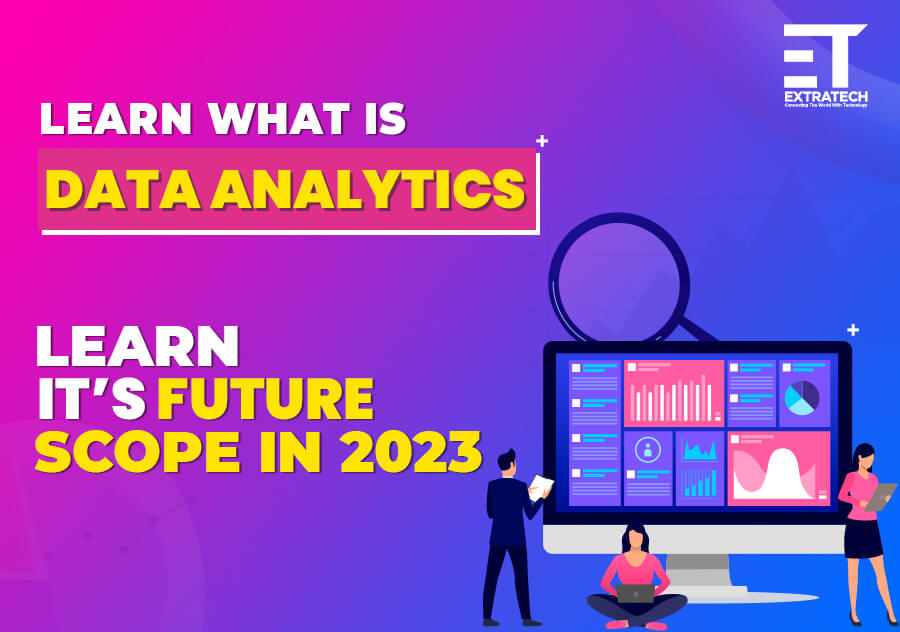


2022-12-08
Everyone wants a job where their work life brings skill, status, and profit—not stress!
Data analytics is indeed a great career. The time is now to be a data analyst more than ever before. Every day, 2.5 quintillion bytes of data are generated, which is only growing. Data analysts are leading this effort in the face of this data explosion. As firms' data collection grows in scope and sophistication, they will undoubtedly want to exploit that data.
Furthermore, Data analysts can benefit from working with others and taking part in high-level decision-making, which may lead to managerial positions. Because of the great demand for data analysts, their pay is high. Many data analysts also relocate to different cities or nations or work remotely. Even if the work doesn't interest you, you'll still benefit from it because of the income, benefits, and job security you'll receive.
Students or professionals planning to turn into data analysts might have questions about the scope of data analytics. One concern is the rapidly changing technologies and operational environments. It's necessary to be aware of your future professional opportunities and potential. We will clearly and thoroughly address all of those problems in this blog.
So, keep reading!
Discovering hidden patterns and undetected trends, finding correlations, and gaining insightful knowledge from vast datasets are all part of the data analytics process used to create business forecasts. It is the field that deals with data management through data collection and data storage from disparate sources, as well as with the processes, tools, and techniques which help in analyzing it.
You may have heard the term "data analytics" much if you live in the twenty-first century. It is one of the terminologies that is currently causing the most buzz.
This is the right read for those who want to kick off their journey in Data Analytics.
Ideally, companies need to use their generated data to derive value from it and make impactful business decisions. The use of Data analytics drives this goal.
Let's examine how to apply data analytics now that you are familiar with it.
Yes, many industries that use data Analytics are those in finance, media, outsourcing, internet commerce, etc. To filter out the potentially dangerous areas of populated data and break down the data that may be accessed, such as banks use data mining technologies.
The safety of their data is a concern for many businesses. Numerous problems relating to data security can be solved using data analytics. Whether from sales agents, equipment manufacturers, or insurance companies, customers' personal information can be obtained through investigations and security measures. An increase in output and greater output have benefited businesses and their employees. To make a career in this field, you should start an Advanced Course on Data Analytics.
The future scope of data analytics can be estimated just by the fact that many start-ups are turning to Big Data to extract the most valuable and relevant information. Various sectors, such as IT, Manufacturing, Banking, Insurance or Financial Institutions, Health Care, Retail & E-commerce, use Data Analytics and have given huge potential to Data Analyst engineers.
The following are entry-level roles in data analytics.
As you gain more experience, you can qualify for mid to upper-level roles.
Engineers with skills and knowledge in data analytics will have the following opportunities.
Data engineers will find numerous opportunities in privacy, cybersecurity, virtual watermarking, and malware detection. The development of data analytics will improve information security.
The Internet of Things (IoT) has been growing continuously at an exponential rate. IoT-generated structured and unstructured data requires mostly more sophisticated analytics tools and techniques.
The future of information analytics is boosted by companies being more vocal about their needs and utilizing data to the fullest extent possible to secure financial gain.
The need for data scientists is growing, with a focus on people who can combine quantitative analysis skills with the ability to present their findings in compelling and visually appealing ways.
Businesses would have significant concerns about data accuracy as they started using datasets to forecast business trends.
The future scope of Data Analytics is infinite. The field is yet in its nascent stage, and much remains unexplored. Moreover, Machine Learning and Artificial Intelligence's impact on Data Analytics is unimaginable. This implies that the future of Data Analytics is filled with exciting discoveries yet to tap potentialities and uncertainties.
Be a part of our top-notched Data Analytics Job Ready Program and see the difference.